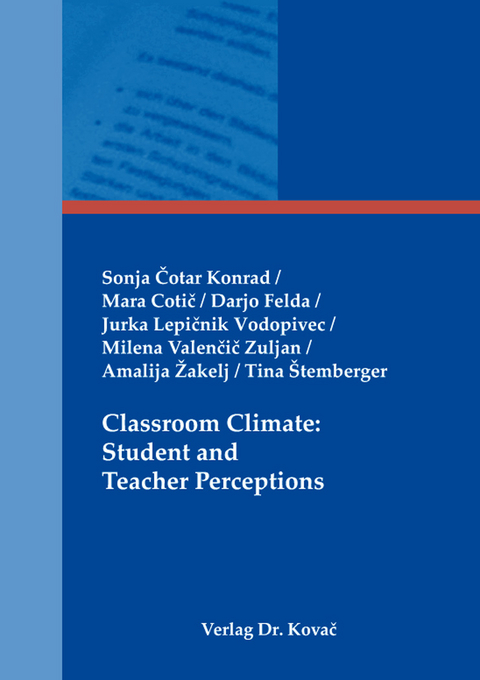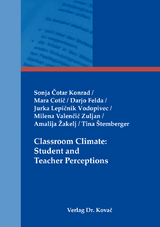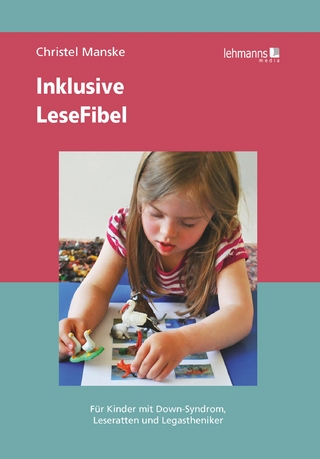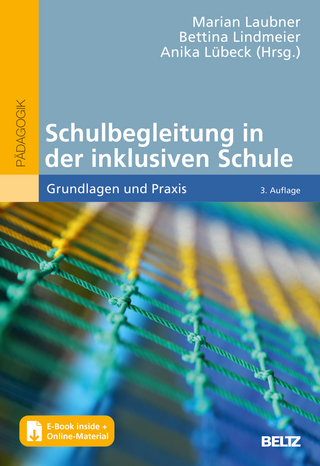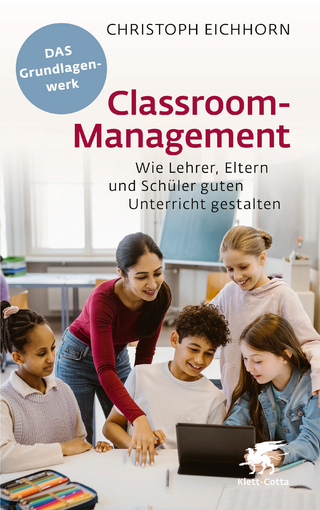Classroom Climate: Student and Teacher Perceptions
Seiten
2021
|
1. Aufl.
Kovac, Dr. Verlag
978-3-339-12570-5 (ISBN)
Kovac, Dr. Verlag
978-3-339-12570-5 (ISBN)
The scientific monograph entitled Classroom Climate: Student and Teacher Perceptions comprises the theoretical and empirical sections.
The theoretical section focuses on the justification of the school’s role of a place that encourages the development of the student’s potentials where we aim to highlight that the teaching and learning of contents prescribed by the curriculum are coupled with other processes that are important for an individual’s development and the development of society and are based on communication and interaction on various levels: between the students, between students and teachers, between teachers and other employees. We then focus on school climate that is an integral part of the school culture and which has been shown by extensive research to be strongly linked to the students’ results. We also consider the classroom climate which is mainly marked by what is happening in the classroom, the classroom atmosphere, mood and environment. Further on, we highlight the importance of interpersonal relationships, interaction and communication in the classroom as important factors of school and classroom climate and we point out to numerous roles of a teacher and their competences. In the empirical section, we present the course and results of the survey involving 1,531 students from Slovenian primary schools and 348 teachers who teach at Slovenian primary schools. The results show that both students and teachers demonstrate a relatively neutral experience of the general classroom climate, students’ peer relationships and the student–teacher relationship, whereby teachers rank all three competences higher than the students. We found that the students’ perception of the general classroom climate, peer relationships and the student–teacher relationship differentiates subject to age and academic achievements. It turns out that older students and students with poorer academic achievements report a lower level of satisfaction with classroom climate, peer relationships and the student–teacher relationship. The teacher’s perception of classroom climate, peer relationships and the student–teacher relationship does not differentiate either subject to the stage of professional development or the professional title. The analysis also leads to the conclusion that there is a moderate to high level of correlation between the self-perception of the student’s relationship with peers and the relationship with the teacher, meaning that the students who experience relationships with other students negatively also experience the relationship with the teacher negatively.
The theoretical section focuses on the justification of the school’s role of a place that encourages the development of the student’s potentials where we aim to highlight that the teaching and learning of contents prescribed by the curriculum are coupled with other processes that are important for an individual’s development and the development of society and are based on communication and interaction on various levels: between the students, between students and teachers, between teachers and other employees. We then focus on school climate that is an integral part of the school culture and which has been shown by extensive research to be strongly linked to the students’ results. We also consider the classroom climate which is mainly marked by what is happening in the classroom, the classroom atmosphere, mood and environment. Further on, we highlight the importance of interpersonal relationships, interaction and communication in the classroom as important factors of school and classroom climate and we point out to numerous roles of a teacher and their competences. In the empirical section, we present the course and results of the survey involving 1,531 students from Slovenian primary schools and 348 teachers who teach at Slovenian primary schools. The results show that both students and teachers demonstrate a relatively neutral experience of the general classroom climate, students’ peer relationships and the student–teacher relationship, whereby teachers rank all three competences higher than the students. We found that the students’ perception of the general classroom climate, peer relationships and the student–teacher relationship differentiates subject to age and academic achievements. It turns out that older students and students with poorer academic achievements report a lower level of satisfaction with classroom climate, peer relationships and the student–teacher relationship. The teacher’s perception of classroom climate, peer relationships and the student–teacher relationship does not differentiate either subject to the stage of professional development or the professional title. The analysis also leads to the conclusion that there is a moderate to high level of correlation between the self-perception of the student’s relationship with peers and the relationship with the teacher, meaning that the students who experience relationships with other students negatively also experience the relationship with the teacher negatively.
| Erscheinungsdatum | 31.10.2021 |
|---|---|
| Reihe/Serie | Studien zur Schulpädagogik ; 93 |
| Verlagsort | Hamburg |
| Sprache | englisch |
| Maße | 148 x 210 mm |
| Gewicht | 157 g |
| Themenwelt | Sozialwissenschaften ► Pädagogik ► Schulpädagogik / Grundschule |
| Schlagworte | Didaktik • Kommunikation • Lernumgebung • Pädagogik • Pädagogische Praxis • Peer-Beziehungen • Schüler-Lehrer-Beziehungen • Schulklima |
| ISBN-10 | 3-339-12570-8 / 3339125708 |
| ISBN-13 | 978-3-339-12570-5 / 9783339125705 |
| Zustand | Neuware |
| Haben Sie eine Frage zum Produkt? |
Mehr entdecken
aus dem Bereich
aus dem Bereich
für Kinder mit Down-Syndrom, Leseratten und Legastheniker
Buch | Softcover (2023)
Lehmanns Media (Verlag)
19,95 €
Grundlagen und Praxis
Buch | Softcover (2022)
Beltz (Verlag)
19,95 €
wie Lehrer, Eltern und Schüler guten Unterricht gestalten
Buch | Softcover (2024)
Klett-Cotta (Verlag)
24,00 €
